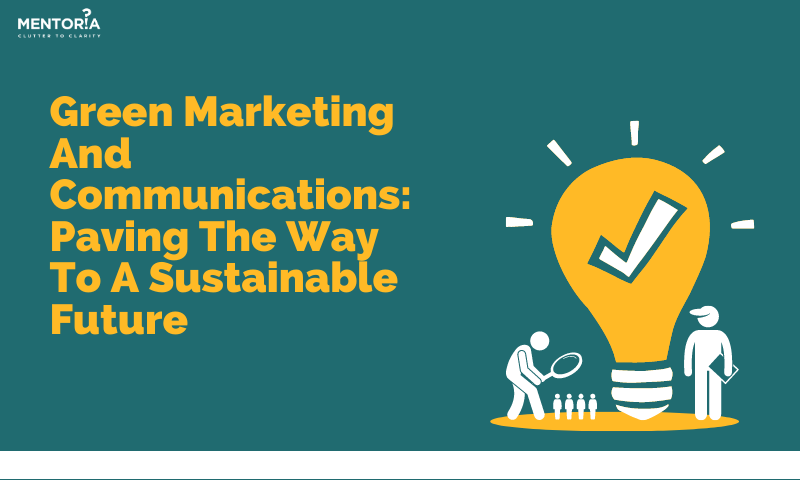Green Marketing And Communications: Paving The Way To A Sustainable Future

Welcome to a world where green practices and sustainability take centre stage. In today’s environmentally conscious society, businesses and consumers are realising the significance of adopting eco-friendly approaches. Green marketing and communications play a vital role in driving this movement, connecting businesses with environmentally aware consumers, and making a positive impact on the planet. In this blog, we will explore the concept of green marketing, its importance, and how it can lead us towards a more sustainable future. So, let’s embark on this exciting journey and discover the power of green marketing!
What Is Green Marketing?
Let’s break it down, shall we? Green marketing refers to the process of promoting products, services, or brands that are environmentally friendly. It involves highlighting sustainable features, such as reduced carbon footprint, use of renewable resources, or biodegradable packaging. The aim of green marketing is to educate consumers about the environmental benefits of a product or service and influence their purchasing decisions in favour of more sustainable options. Green marketing goes beyond simply slapping a “green” label on a product. It requires a holistic approach, incorporating sustainable practices throughout the entire product lifecycle, from sourcing and manufacturing to distribution and disposal. By integrating environmental considerations into their business strategies, companies can reduce their ecological footprint and contribute to a more sustainable future.
The Importance Of Green Marketing
Why does green marketing matter so much? Well, it’s all about capturing the hearts and minds of environmentally aware consumers. As consumers become more aware of the impact their choices have on the planet, they seek out businesses that align with their values. By adopting green marketing strategies, companies can differentiate themselves from competitors, build customer loyalty, and attract a growing market segment of environmentally conscious consumers.
Furthermore, embracing green marketing practices can lead to a competitive advantage. Studies have shown that consumers are willing to pay a premium for eco-friendly products and are more likely to remain loyal to companies that prioritise sustainability. By effectively communicating their sustainable initiatives, businesses can tap into this demand, increase market share, and drive profitability.
Communicating Sustainability
Alright, time to talk about communication. Effective communication is key to successful green marketing. Businesses need to convey their sustainable practices and initiatives clearly and transparently to consumers. This can be achieved through various channels, such as social media, websites, packaging, and advertising campaigns. Clear and concise messaging, coupled with appealing visuals, can help engage consumers and raise awareness about the company’s commitment to sustainability.
Trust is everything in the world of green marketing. Consumers today are savvy and demand authenticity. They want to see tangible evidence that your claims of being eco-friendly are backed up by real actions. Providing certifications and evidence can help establish credibility and build trust. Show them you’re the real deal!
Moreover, storytelling plays a crucial role in green marketing. By sharing the company’s sustainability journey, challenges faced, and future goals, businesses can create an emotional connection with consumers. Effective storytelling can inspire and empower consumers, making them feel like they are part of a larger movement towards a greener future.
Benefits Of Green Marketing
Green marketing isn’t just good for the planet; it’s good for business too! For businesses, it can lead to cost savings through energy efficiency, waste reduction, and increased operational efficiency. By adopting sustainable practices, companies can minimise resource consumption, optimise processes, and reduce expenses in the long run.
In addition to cost savings, green marketing helps build a positive brand image and enhances reputation. Businesses that prioritise sustainability are viewed as responsible corporate citizens, which can attract environmentally conscious consumers and generate positive word-of-mouth. By aligning with consumer values, businesses can foster customer loyalty and create long-lasting relationships.
For consumers, green marketing empowers them to make more informed choices. By providing transparent information about a product’s environmental impact, companies enable consumers to align their purchasing decisions with their values. This encourages a shift towards sustainable consumption patterns and contributes to a healthier planet for future generations.
Challenges And Solutions
No journey is without its challenges, and green marketing is no exception. One of the primary challenges is the issue of “greenwashing.” Greenwashing occurs when a company misleadingly portrays its products or practices as environmentally friendly when they are not. This can mislead consumers and undermine the credibility of genuine eco-friendly companies. To address this challenge, regulatory bodies have introduced guidelines and standards to ensure accurate and transparent communication. Businesses should adhere to these guidelines and avoid making false or exaggerated environmental claims.
Another challenge is the complexity of measuring and quantifying the environmental impact of products and services. Sustainability encompasses various dimensions, including energy consumption, carbon emissions, water usage, waste management, and social responsibility. Accurately measuring and communicating these impacts can be complex and require a robust methodology. Businesses should invest in reliable data collection and reporting systems to provide accurate and credible information to consumers.
Additionally, some consumers may perceive sustainable products to be more expensive. Overcoming the price barrier requires businesses to effectively communicate the long-term benefits and cost savings associated with eco-friendly choices. Emphasising the durability, energy efficiency, and potential savings over time can help shift the perception that sustainability is solely a luxury for the affluent.
Inspiring Sustainability
Green marketing is not limited to promoting eco-friendly products; it also has the power to inspire sustainable behaviours among consumers. By showcasing the positive environmental impact of their choices, businesses can encourage individuals to adopt eco-friendly practices in their daily lives. One way businesses can inspire sustainability is through educational campaigns. By providing information and resources on sustainable living, companies can empower consumers to make greener choices. For example, a clothing brand could educate consumers about the environmental impact of fast fashion and promote the benefits of buying durable, ethically produced garments.
Collaborations and partnerships with environmental organisations can also play a significant role in inspiring sustainability. By joining forces, businesses can amplify their message and leverage the expertise and credibility of environmental advocates. This can involve supporting environmental initiatives, participating in clean-up campaigns, or funding conservation projects.
Embrace A Sustainable Future With Mentoria
Green marketing and communications play a vital role in promoting sustainability and eco-friendly practices in today’s business landscape. By adopting environmentally conscious strategies and effectively communicating their green initiatives, companies can not only enhance their brand reputation but also contribute to a healthier planet. The increasing consumer demand for eco-friendly products and services further emphasises the importance of integrating green practices into marketing and communication efforts. And if you need more help, Mentoria is here for you. Together, we can create a greener future for businesses and the environment.









